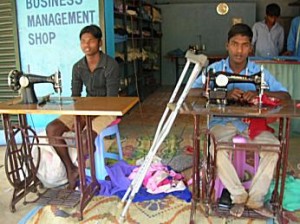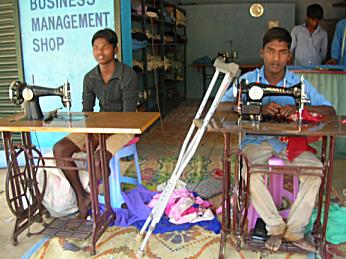
Companies like Integra Garments, ITC Hotels, ITC Agarbatis, Coffee Day and IBC Hotels and Resorts participated in the fair, and employed 70 people with low vision or hearing disability or mild mental retardation and other physical disabilities. They are not highly qualified people, and have been given vocational training by EnAble to allow them to be usefully employed and earn a living.
We can see what a difference it has made in their lives form the following article in Thaindian:
“I am happy that I got a job. I am no more dependent on my parents,” said an excited Bina Prasad, 22, who is hearing impaired and was chosen by Bangalore-based Integra Garments as a tailor.
Echoing Bina’s emotion, 23-year-old Sourav Shukla, who has locomotive disorder and was offered a job by ITC Agarbati, said the job would help him lead life with dignity. Sourav is a trained incense maker.
According to the World Bank report, there is a great difference between the opportunities and economic conditions of the disabled people in India from their healthy counterparts:
People with disabilities are among the most excluded in Indian society, according to “People with Disabilities in India: From Commitments to Outcomes”, a report prepared by World Bank in collaboration with the central Ministry of Social Justice and Empowerment in 2007.
The report states that disabled adults have far lower employment rates than the general population and this fell from 43 percent in 1991 to 38 percent in 2002, even in the midst of high economic growth.
This is a commendable step forward for inclusive growth, and we hope the beginning of many similar initiatives in the future in order to bridge the gap.
Read the complete article here.
Image Courtesy: www.newhopeaustralia.org
If you found our stories insightful, informative, or even just enjoyable, we invite you to consider making a voluntary payment to support the work we do at The Better India. Your contribution helps us continue producing quality content that educates, inspires, and drives positive change.
Choose one of the payment options below for your contribution-
By paying for the stories you value, you directly contribute to sustaining our efforts focused on making a difference in the world. Together, let's ensure that impactful stories continue to be told and shared, enriching lives and communities alike.
Thank you for your support. Here are some frequently asked questions you might find helpful to know why you are contributing?

